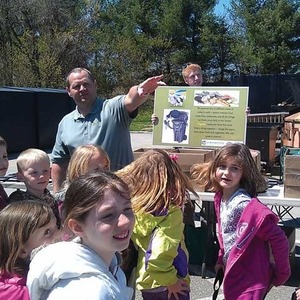Advancing Landfill Gas




May 22, 2015
BY Ron Kotrba
Growing up, Chris Voell lived the all-American childhood outside Buffalo, New York, with two caring parents and three younger siblings. Long, carefree bicycle rides, baseball and family camp outings defined those fleeting summer days while ice skating helped ward off the hard Buffalo winter chills. His baseball team at St. Francis Catholic School went 30-0, a passionate high point of his young playing days. His love of fishing and hiking manifested in his desire to become a park ranger, but Voell’s plans were thwarted early on—something he regrets to this day.
“Two of my true loves in life are the outdoors and talking to people, especially meeting folks I don’t know,” Voell says. “I got scared away when someone told me something like ‘Only one out of a thousand who want to be a park ranger get to do that.’ I think I would have made a great one.”
Voell’s father was an environmental engineer before the phrase was even coined, he says. “We would visit landfill and wastewater treatment plants while on family vacations and learn about how we manage our waste streams,” Voell tells Biomass Magazine.
After high school, Voell earned his associate’s degree in the forestry preprofessional program from Paul Smith’s College in the Adirondacks. “When I finished, I still wasn’t sure what to do,” he says. He moved to the Washington, D.C., area and began working for the Governmental Refuse Collection and Disposal Association—now the Solid Waste Association of North America—in 1986. Later, while still with SWANA, he attended to University of Maryland and received his bachelor’s degree in natural resources management.
“When I joined SWANA, the Landfill Gas Committee was the strongest and most influential member-based organization within the association,” Voell says. Therefore, the control and use of landfill gas was at the forefront of many of SWANA’s efforts, providing the 21-year-old Voell his initial education on producing, controlling and using renewable energy. “The people who began and fostered the landfill gas energy industry into what it is today were a very innovative and hard working group,” he says. Lenny Hickman, executive director, was Voell’s mentor for a decade and taught him most of what he knows about solid waste—and provided Voell with instrumental introductions to others such as N.C. Vasuki with Delaware Solid Waste Authority, Tim Hunt with Palm Beach County Solid Waste Authority and Davis Myers with Monterey Regional Waste Management District. “All of these innovators were providing baseline management services to the citizens of their communities through landfills and waste-to-energy facilities, but also pushing the envelope in terms of recovering resources through recycling, composting, source reduction and energy recovery,” he says.
SWANA primarily represented the public sector, but Voell also worked closely with the private waste sector. “While we sometimes did not see eye to eye, we regularly collaborated with the National Waste & Recycling Association,” he says. “I certainly learned a lot from NSWMA on how the private sector viewed the industry and how public-private partnerships can be an asset.” At SWANA, Voell regularly interfaced with a variety of other groups. “When National Recycling day was launched, I served as SWANA’s rep to the group,” he says. “I think what I learned working with SWANA is that I truly love working with the professionals in the solid waste industry. They are some of the most dedicated and genuine people I know.”
Three years after leaving SWANA, Voell joined the U.S. EPA’s Climate Change Division as manager of voluntary methane programs (Landfill Methane Outreach Program, AgSTAR), “some of the best programs the agency ever launched,” he says. Voell was instrumental in progressing landfill gas, aenorobic digestion and wastewater treatment biosolids digestion projects and education. “I treated my role each day at EPA as a chance to help grow the biogas energy industry in the U.S., and later when the Global Methane Initiative was formed, a chance to share what we’d learned internationally,” he says. Much of his time abroad was spent in Ukraine. “While not easy, we eventually found a landfill in the south of the country at which to install a landfill-gas-fired infrared heating system that uses a relatively small amount of gas to supply heat to on-site and adjacent buildings,” Voell says. “This has become a showpiece for the efforts in Ukraine.”
In 2012, Voell left EPA and joined BioCNG LLC as its eastern sales manager, where he presented at approximately 20 regional and national solid waste and alternate vehicle shows regarding biogas-to-CNG possibilities. In the same year, he became a board member at the American Biogas Council and served two years in that role. “Most people aren’t aware that biogas can be upgraded to pipeline quality, much less compressed and used for natural gas vehicles,” he says. “Probably the biggest impact I had personally was helping to educate people on this and dispel rumors that this cannot be done.”
Today, Voell is business development manager for Aria Energy, one of a handful of landfill gas energy developers that has built its business exclusively on landfill gas energy project development, with more than 50 projects since its inception. Aria currently owns and operates 44 electricity and renewable natural gas projects across 16 states.
When asked what his greatest professional accomplishments have been, Voell says, “I’m not going to try to point to one big thing or large project I’ve done, because my career hasn’t been defined in that way. I’d like to think that in a million little ways I’ve really helped move all of the sectors I’ve been involved in advance. One of my greatest joys comes from helping people become connected and better educated.”
Author: Ron Kotrba
Senior Editor, Biomass Magazine
218-745-8347
rkotrba@bbiinternational.com
Advertisement
Advertisement
Advertisement
Advertisement
Upcoming Events





